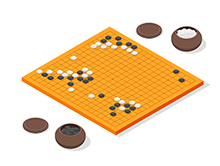 It's an audacious thing to say, that human knowledge is a constraint on our imagination and innovation.
It's an audacious thing to say, that human knowledge is a constraint on our imagination and innovation.
I was reminded of this last week in a conversation with Dr. Pedro Marcal. Pedro is the author of MARC, the first nonlinear finite-element code, long since acquired by MSC. Now, at age 80, Dr. Marcal continues to write Python scripts to apply optimization techniques to his own nonlinear FE solvers for composite materials.
Go is a Chinese game that has been played for thousands of years. https://en.wikipedia.org/wiki/Go_(game). It involves placing tokens on a board. While the rules are simple, many will say the game is more difficult to master than chess. A successful Go-playing computer program was built using a compilation of human strategies and a data base of perhaps 100,000 games previously played by experts. This program took months to build, and can beat most expert players most of the time.
But then, Artificial Intelligence and Machine Learning evolved to a new level. In 2017 an application was created where the only knowledge given to the program was the rules of the game. The application then "learned" by playing against itself. Within a few days, the application was able to beat both human experts and previous computer programs almost 100% of the time. It discovered unknown (or, perhaps, forgotten) strategies.
Here is a web article https://www.theverge.com/2017/10/18/16495548/deepmind-ai-go-alphago-zero-self-taught and the original technical paper in "Nature". https://www.nature.com/articles/nature24270.epdf
In the words of the web article, "By not using human data - by not using human expertise in any fashion - we've actually removed the constraints of human knowledge."
That is a truly audacious statement. Don't we all know that companies succeed because of their human capital, their intellectual property, their collective tribal knowledge? Perhaps, but we also all know that knowledge can be an inhibitor: "We've always done it that way."
I think these are very exciting developments, particularly for product development, optimization, and design space exploration. Such algorithms offer the promise of achieving designs we cannot imagine.
This is exhilarating, but also scary. Potentially, innovation is democratized. Your previous experience does not matter much anymore.
Let me know what you think!
Keith
